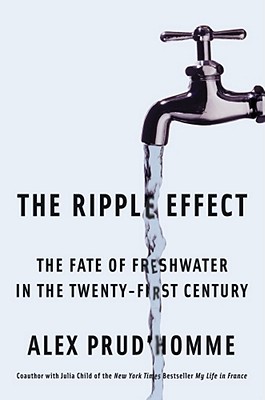I am just now in my last chapter of this marvelous book and had to stop to write this review of it since I can't stand not having anyone who's read it to talk with about it!! In The Ripple Effect: The Fate of Freshwater in the 21st Century, Alex Prud'homme takes the reader on an often riveting tour of the state of freshwater all around the globe,
but focuses mostly on the USA. Readers fascinated by The World Without Us will be hooked reading about NYC's uniquely challenging water concerns. Those with personal
connections to places like New Orleans, the Baca Ranch in Colorado, Las Vegas, Nevada, not to mention the states of California, Arizona and Alaska will likely, like me, be
encouraging friends and family with equally or stronger ties to READ THIS BOOK to better understand this precious resource and the trajectory of its properties converging with
human influence connecting with, well, pretty much everything. And learn how we can and do impact its quality and accessibility with our daily habits as well as apathy or
willingness to look at what is, to put it mildly, a 'force of nature' -squarely in the eye, with every ounce of humility & care that that might inspire.
Written before the Fukushima nuclear power plant catastrophe, I'd imagine when the paperback eventually comes out, the author might include a pretty interesting addendum. But even if he doesn't, as it stands, this book is one astoundingly complex, yet highly readable, (not at all 'dry'.... sorry I just had to say that) accessible piece of superb journalistic writing that delves into how freshwater flows through the human world,
explaining the 'ripple effects' of floods and droughts, the hidden costs of agriculture as we now know it, the processes involved in hydrofracking, gold-mining and nuclear energy production, all the while examining the economics of water from Cochabamba, Bolivia to the bottled water you may have been drinking today, and historical human solutions to sometimes shockingly frightening water problems ranging from brilliant to
disastrous. Business as usual is frequently the elephant in the room and the many people you'll meet in the book whose livelihoods, passions, or power revolve around freshwater are as intriguing a group as you'd ever run across in a thriller or epic novel, and will have you not only rethinking your next trip to the carwash but paying much closer attention to the astonishing ways water is being used, privatized, wasted, respected or
controlled in your household, community, bioregion and world. Reviewers are writing that Prud'homme has done for our understanding of water what Pollan did for the food system or Yergin for oil. My hope is that this book will do what it does a whole lot faster.
--Lynn

No comments:
Post a Comment